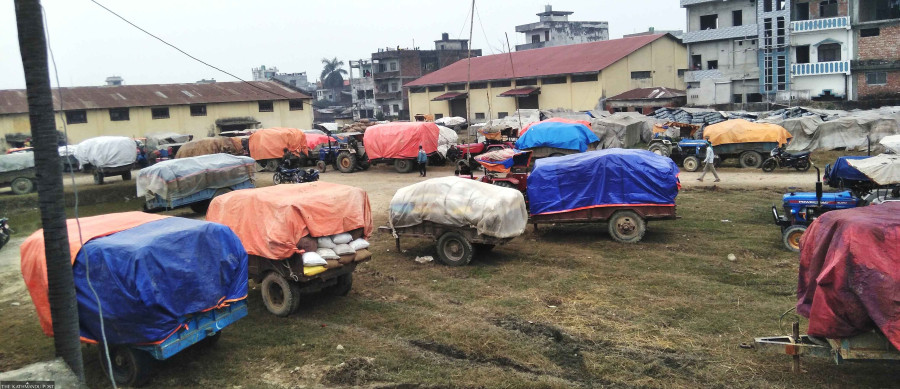Money
Lockdown, unseasonal floods and loss in quality dealt triple blow to paddy farmers
Paddy procurement by the state-owned food supplier in Parsa and Kailali has either been cancelled or postponed due to poor quality of crop.
Ganesh Chaudhary & Shankar Acharya
A triple blow has hit farmers in the eastern and far west Nepal, the country’s rice bowl.
With Covid-19 cases spreading rapidly during late April and May last year, the government had enforced a second lockdown across the country from April 29, 2021.
Hundreds of people died in the devastating second wave. The second wave severely affected the livelihoods of farmers. However, the farmers' woes did not end.
The country suffered floods following unseasonal torrential rains starting on October 17 that killed more than 100 people and left settlements in several districts under water for days.
Heavy rainfall is unusual in Nepal in October, which is traditionally outside the monsoon season.
The Ministry of Agriculture and Livestock Development said that the unusual rainfall had caused losses amounting to Rs11.87 billion. The ministry said that an estimated 424,113 tonnes of paddy on 111,609 hectares had been destroyed.
After the devastating floods, hapless farmers faced yet another trouble.
The Food Management and Trading Company, the state-owned food supplier, decided not to procure paddy in Kailali and postponed the procurement plan in Parsa this year, because of the poor quality of crop.
Standing paddy crops on tens of thousands of hectares were flooded and inundated. The harvested paddies were soaked in the rain.
In Parsa, the state-owned food supplier said that most of the paddies brought by farmers don't meet the moisture content.
The Food Management and Trading Company in Kailali has informed the farmers that their crop was not good enough in terms of quality.
“Paddy procurement has been postponed because of the non-availability of quality crops,'' said Angela Basnet, chief of the Food Management and Trading Company of Sudurpaschim Province.
"We have been instructed not to buy paddies that are of poor quality. Accordingly, we have stopped the procurement," she said. “Due to the unseasonal rain in October, most of the crop has been damaged.”
As farmers started to harvest paddy, the company has enacted a temporary guideline to purchase paddy at the price fixed by the government to prevent buying of paddy that are of poor quality.
As per the criteria, paddy should not be wet and needs to be clean. The crop should not contain soil and straw. The paddy will be procured by the company only after the technicians approve it following checks.
For this fiscal year, the Cabinet meeting held on September 14 last year, the minimum support price of “common paddy” has been raised to Rs29.02 per kg from Rs28.85 per kg last year. In the previous year, the price of common paddy was Rs26.73 per kg.
The minimum support price for "mota dhan" (short grain) has been set at Rs27.52 per kg, up from Rs27.35 per kg last year. In the previous year, the price was Rs25.32 per kg.
The floor price is the lowest price that can be charged for a commodity. The measure is intended to encourage farmers to grow crops. The price is computed based on the cost of production, transportation charges and inflation.
The state-owned company has targeted to purchase 3,500 tonnes of paddy in Kailali this year.
The company started procurement of paddy in Tikapur but stopped the procurement due to poor quality. According to the company, so far, 1.4 tonnes of paddy has been procured in Tikapur and 3.2 tonnes in Mohanpur of Dhangadhi.
Karam Chaudhary, a farmer of Janaki Rural Municipality-3, said he is in trouble after the company stopped buying his paddy. The government has announced the price of paddy and farmers are unable to sell them.
His paddy harvested in mid-October has not been sold yet. He fears that his crop might be damaged or eaten by mice if he fails to sell them.
Farmers said that they are compelled to ask local merchants to buy their crop at any rate.
"The paddy rates are currently being fixed by the local merchants," said Kamal Budha, another farmer of Janaki Rural Municipality. “I was compelled to even sell my ‘clean paddy’ at Rs 20 per kg. We need cash to manage household expenses.”
Paddy is cultivated on 70,000 hectares in Kailali.
Last year, the company had targeted to procure 6,500 tonnes of paddy from farmers. The company later procured 7,300 tonnes, Basnet said.
Meanwhile, the Food Management and Trade Company in Birgunj has refused to buy paddy from farmers due to quality concerns.
Bikas Katuwal, chief of the company, said that most of the paddy brought by farmers to the company’s depot do not meet the moisture content. “The problem may have occurred due to the cold wave that has continued for the last two weeks and farmers have not been able to dry them.”
Before the cold wave, there was not a problem, he said. The moisture content of paddy, which was up to 16 percent two weeks ago, is at 18 percent now, Katuwal said.
“We have to return paddy with more than 18 percent moisture,” Katuwal said. "The problem is seen in 8 out of 100 tractors that have been bringing paddy daily to the depot," he said. “We have been requesting farmers to bring the paddy again by drying it.”
The depot has already purchased 950 tonnes of sona mansuli from farmers.
Katuwal said that the farmers have not been able to sell “jira masino” variety till now as the company is purchasing the sona mansuli only.
The depot started procuring paddy from December 22 and has a target of purchasing 1,800 tonnes of paddy —1,500 tonnes of sona mansuli and 300 tonnes of jeera masino.
This year, a procurement committee headed by Chief District Officer had fixed the floor price of jeera masino at Rs 29 per kg. The floor price of sona mansuli has been fixed at Rs 29.02 per kg as fixed by the federal government.
Asarfi Sah, president of Farmer Association Parsa, said that the company should not be reluctant in buying paddy from farmers. “The problem of moisture was due to natural causes. "We have been hit by the October rains and then cold waves," he said. "The state-owned company should understand our pain."




 15.12°C Kathmandu
15.12°C Kathmandu.jpg)















